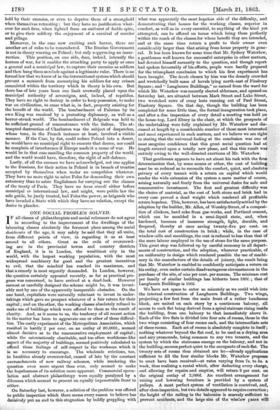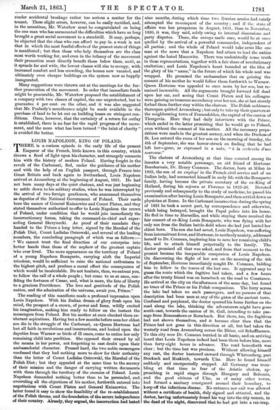ONE SOCIAL PROBLEM SOLVED.
1F all classes of philanthropists and social reformers do not agree in according to the improvement of the dwellings of the labouring classes absolutely the foremost place among the social desiderata of the age, it may safely be said that they all unite, from different points of view, in regarding it as at least second to all others. Great as the evils of overcrowd- ing are in the provincial towns and country districts of England, it is in London, the wealthiest city in the world, with the largest working population, with the most widespread machinery for good and the greatest incentives to evil, that the mischief has reached its maximum, and that a remedy is most urgently demanded. In London, however, the question certainly appeared recently, as far as practical pro- gress was concerned, to have arrived at a dead-lock. However earnest or carefully designed the scheme might be, it was invari- ably met by one of the apparently insuperable obstacles. On the one hand, capitalists were naturally reluctant to invest in under- takings which gave no prospect whatever of a fair return for their capital ; and on the other, the working classes absolutely refused to make use of buildings which were offered to them as the result of charity. And, as it seems to us, the tendency of all recent action in the matter has been to aggravate one or other of these difficul- ties. The costly experiment of the Metropolitan Association, which resulted in hardly 2 per cent. on an outlay of 80,000/., seemed almost decisive as to the remunerative employment of capital ; while the ostentatiously charitable, and too often workhouse-like aspect of the majority of buildings, seemed positively calculated to offend those feelings of self-respect in the workman which it is so necessary to encourage. The wholesale evictions, too, in localities already overcrowded, caused of late by the constant encroachments of new railway schemes, while rendering the question even more urgent than ever, only seemed to make the hopelessness of its solution more apparent. Commercial specu- lation and abstract philanthropy were equally paralyzed by a dilemma which seemed to present an equally impenetrable front to either.
On Saturday last, however, a solution of the problem was offered to public inspection which there seems every reason to believe has decisively put an end to this stagnation by boldly grappling with what was apparently the most hopeless side of the difficulty, and demonstrating that houses for the working classes, superior in comfort, as well as in every essential, to anything of the kind yet attempted, can be offered on terms which bring them perfectly within the reach of the classes for whose benefit they are intended, and at the same time return a profit to their owner even considerably larger than that arising from house property in gene- ral. It has been known for some time that Mr. Sydney Waterlow, a gentleman well known for successful enterprise in other matters, had devoted himself earnestly to the question, and though report had spoken favourably of his efforts, people were hardly prepared for the triumphant conclusion to which his first experiment has been brought. The /orate chosen by him was the densely crowded and wretchedly built mass of hovels lying north-east of Finsbury Square ; and "Langbourn Buildings," so named from the ward for which Mr. Waterlow was recently elected alderman, and opened on Saturday last, are situated between Mark Street and Luke Street, two wretched rows of crazy huts running out of Paul Street, Finsbury Square. On that day, though the building has been completed for some little time, the formal inauguration took place, and after a due inspection of every detail a meeting was held on the house-top, Lord Ebury in the chair, at which the prospects of the undertaking were fully explained by Mr. Waterlow and dis- cussed at length by a considerable number of those most interested and most experienced in such matters, and we believe we are right in stating that the universal feeling at the conclusion was one of most sanguine confidence that this great social question had at length entered upon a totally new phase, and that this result was entirely owing to the well-directed exertions of Mr. Waterlow.
That gentleman appears to have set about his task with the firm determination that, by some means or other, the cost of building must be so reduced as to reconcile the comfort, quiet, and absolute privacy of every tenant with a return on capital which would render the wide extension of the system a mere matter of course, arising naturally and freely from the universal desire for safe and remunerative investment. The first and greatest difficulty was the choice of material, as the cost of both stone and brick had in every case proved a dead weight which rendered all profitable return hopeless. This, however, has been satisfactorily settled by the adoption by the builder, Mr. Allen, of Worship Street, of a composi- tion of clinkers, hard coke from gas .works, and Portland cement, which can be moulded in a semi-liquid state, and, when hardened, becomes of immense strength, light, durable, and fireproof, thereby at once saving twenty-five per cent. on the total cost of construction in brick ; while, in the case of window-sills and mouldings, the cost is reduced to less than that of the mere labour employed in the use of stone for the same purpose. This great step was followed up by careful economy in all depart- ments of construction, and the adoption, wherever practicable, of an uniformity in design which rendered possible the use of machi- nery in the manufacture of the details of joinery, the result being that Mr. Waterlow is enabled to confidently anticipate a return on his outlay, even under certain disadvantageous circumstances in the purchase of the site, of nine per cent, per annum. The minimum CAA per family of similar buildings has hitherto been 1801.; that of Langbourn Buildings is 100/.
We tave not space to enter so minutely as we could wish into the internal construction of Langbourn Buildings. Two wings, projecting a few feet from the main front of a rather handsome block, are united on each story by a continuous balcony, all access to each flat being derived from a spiral staircase rising inside the building, from one balcony to that immediately above it. Each of the five fiats is divided into four sets of rooms, those in the two wings consisting of four rooms each, and the intermediate sets of three rooms. Each set of rooms is absolutely complete in itself; nothing whatever beyond the flat roof, to be used as a drying area and airy promenade, being common to any two tenants, and the system by which the staircases emerge on the balcony, and not in the building, secures perfect quiet to the occupants of each flat. The twenty sets of rooms thus obtained are let—already applications sufficient to fill the four similar blocks Mr. Waterlow proposes to erect have been received—at rates varying from 7s. to 5s. a week, thus realizing a rental which, after deducting every charge, and allowing for repairs and empties, will return 9 per cent. on the original outlay of 2,000/. An excellent arrangement for raising and lowering furniture is provided by a system of pulleys. A most perfect system of ventilation is contrived, and, after close inspection, but two details appeared to require correction; the height of the railing in the balconies is scarcely sufficient to prevent accidents, and the large size of the window rants will render accidental breakage rather too serious a matter for the tenant. These slight errors, however, can he easily rectified, and, in the meantime, Mr. Waterlow must be congratulated on being the one man who has surmounted the difficulties which have so long brought a great social movement to a standstill. It may, perhaps, be objected that the class who can afford to pay 5s. a week is not that in which the most fearful effects of the present state of things is manifested ; but then those who help themselves are the class most worth working for, and even in the infancy of the movement their promotion must directly benefit those below them, until, as it spreads far and wide, the lowest classes will rise to occupy, with increased comfort and less crowding, the houses now vacated, and ultimately even cheaper buildings on the system now so happily inaugurated.
Manysuggestions were thrown out at the meetings for the fur- ther prosecution of the movement. In order that immediate funds might be procurable, Mr. Waterlow proposed the establishment of a company with two classes of capital, the one unprotected, but to guarantee 4 per cent. on the other, and it was also suggested that Mr. Peabody's munificence might be made available in the purchase of land to be let out on building leases on stringent con- ditions. Once, however, that the certainty of a return for outlay is established, there is no fear for the rapid progress of the move- ment, and the more what has been termed "the taint of charity" is avoided the better.































 Previous page
Previous page